Artificial heart to give new hope to heart failure patients

A revolutionary, implantable mechanical device to be tested at The Alfred is set to provide new hope to patients with debilitating heart failure.
The Total Artificial Heart is intended to fully replace a natural heart, providing patients with a possible alternative to heart transplant, said project co-lead and Director of Cardiology at The Alfred, Prof David Kaye.
“Currently, some patients with heart failure are eligible for heart pumps on one side of their heart, or even two if both sides are failing,” said Prof Kaye.
“Although devices such as these were developed some time ago as lifesaving technology, they are often a temporary solution and there are many limitations as to what they can do.
"For example, the current series of Ventricular Assist Devices are cumbersome, can’t automatically respond to the body’s physical demands, and come with their own set of risks, like infection.
“Instead, the Total Artificial Heart, developed in Australia by BiVACOR, can adapt its pumping capabilities through a novel engineering solution pioneered by the team,” said Prof Kaye.
For patients like Peter Callinan, 48, current VAD technology keeps his heart beating while he awaits a heart transplant.
“I’m incredibly grateful for what’s been made available to me because it’s kept me alive – I have a young family, a job I love and a life to live while I wait for the call,” said Peter.
“Knowing there is technology developing out there that will mean more people can live longer, and have a better quality of life, is incredible.”
The Total Artificial Heart is one of three heart technologies being created under the Artificial Heart Frontiers Program, based at the Monash Alfred Baker Centre for Cardiovascular Research at The Alfred.
The team is also creating a new Mini-Pump and a new type of Left Ventricle Assist Device, both which can be implanted next to a natural heart.
Minister for Health and Aged Care, The Hon Mark Butler, was today at The Alfred to announce that Artificial Heart Frontiers Program has been awarded a $50 million grant from the Medical Research Future Fund towards developing and commercialising the three key devices.
“As well as the obvious health benefits, this is an incredible story of Australian ingenuity and sovereign manufacturing, with collaboration across universities, clinical hospitals and industry to develop the world’s most advanced artificial heart,” said Minister Butler.
Led by Monash University, the Artificial Heart Frontiers Program is a collaboration between industry partner BiVACOR, The Alfred, Baker Heart and Diabetes Institute, St Vincent’s Health Australia, University of Sydney, University of New South Wales, Griffith University and University of Queensland.
For more information click here.


